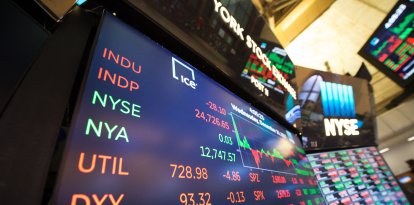Oil prices jump more than 4% after Iranian attack and bombing of Israeli civilians
Prior to the attacks, the oil market had been trading near a two-week low. There is tension due to a possible disruption of production by the criminal Iranian regime, which could have serious repercussions on global oil prices.

Oil production
Oil prices rose as much as 4% after Iran attacked Israeli territory and civilians with ballistic missiles and more weapons, due in part to rising tensions and fears about a disruption in crude oil supply.
Brent futures gained $2.42 (3.3%), settling at $73.98 per barrel. While West Texas Intermediate (WTI) futures in the United States rose $2.47 (3.45%) to $72.30 per barrel (prior to this varied rises of up to 4%).
Netanyahu: Iran 'will pay for it'
Tension over costs is still present. Following the Iranian attack, Israeli Prime Minister Benjamin Netanyahu responded firmly, calling it a "big mistake" and warning Iran that it "will pay for it." Analysts warn that a possible Israeli attack on Iranian oil production or export facilities could disrupt more than a million barrels of crude oil per day, severely affecting the global energy market.
Meanwhile, in the Red Sea, the Houthis, an Iranian-backed criminal terrorist group in Yemen, claimed responsibility for attacking a stranded ship. This group has stepped up its attacks on international shipping since November in support of Hamas terrorists.
The situation raises international concern. Tamas Varga, an analyst at PVM, a firm that is part of oil instruments broker TP ICAP, said, "There is now a genuine fear that oil supply will be impacted, and nervous and volatile trading is anticipated until the picture becomes clear. ... In case of an escalation, Iran's proxies, the Houthi rebels and Iraqi paramilitaries, might launch attacks on Middle East oil producers, namely Saudi Arabia."
Kharg Island, Iran: A strategic location
Prior to the attacks, the oil market had been trading near a two-week low due to expectations of rising supplies and weak global demand growth. Starting in December, OPEC (Organization of the Petroleum Exporting Countries) plans to increase production by 180,000 barrels per day each month.
However, the situation puts the entire market at risk, as Iran's oil production has seen a 50% jump in the last two years, which has significantly increased the traffic of crude-carrying ships. Most of these tankers use Kharg Island in Iran as a base to export their oil, especially to China, which has tripled its imports from Iran in that period.
Kharg Island, with its large-capacity storage infrastructure and terminals capable of handling supertankers, is a strategic hub for Iranian oil exports. Its proximity to the Strait of Hormuz, where a third of globally traded oil travels through, gives it considerable influence on world energy trade routes. Any disruption on this island or in the strait could have serious repercussions on global oil prices.



























